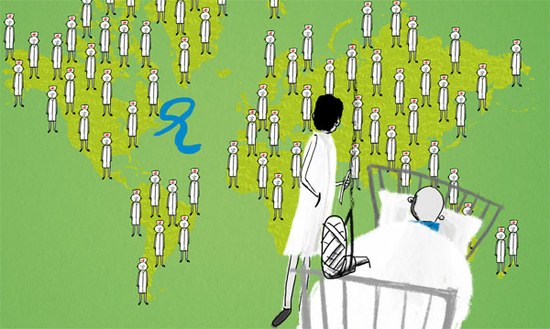 Contribution to the Annual Report 2015 of the MMI Network
Contribution to the Annual Report 2015 of the MMI Network
Worldwide, there is a shortage of skilled health workers. Wemos advocated for health workforce worldwide within the EU-funded project Health Workers for All. In 2015, we succeeded in pushing the implementation of the WHO Global Code of Practice higher on the agenda of the European Commission. Although the project finished by the end of February 2016, we will continue our work within the Health Systems Advocacy Partnership, a five-year collaboration with organizations in the Netherlands, Kenya, Uganda and Zambia.
On our visit to Uganda in November 2015, it was striking to hear the head of a District Health Team in central Uganda tell how frustrating it is to have too few staff on all locations within the district. As a consequence, existing health workers get overworked; some may even decide to turn their backs to the health profession. The permanent lack of basic medication is another reason of frustration among the health workers in Uganda. A midwife told us how harsh it is not to be able to give any oxytocin to women during their delivery. Also simple diagnostic tools are missing.
The facts of reality in Uganda and other African countries pinpoint the urgency of drawing attention to the shortage of staff and basic medication on a global scale. Within the Health Systems Advocacy Partnership, we hope to draw attention to the problem, not only in Uganda or other African countries, but also at the World Health Organization. The recruitment, training and migration of health workers should be regulated globally.
In the Health Workers for All (HW4All) project (1), we have advocated for the implementation of the WHO Global Code of Practice on the International Recruitment of Health Personnel. Based on the principle of Policy Coherence for Development, HW4All urged EU Member States not to overly rely on foreign trained health workers and support low- and middle-income countries in strengthening their health systems and health workforces. As a result of our activities, the Code is now higher on the agenda of the European Commission (2). At the 65th session on the WHO Regional Committee for Europe in September 2015 the WHO European Region also launched the report ‘Making progress on health workforce sustainability in the WHO European Region’ (3) with references to the work of HW4All, and emphasizes the critical role that civil society plays in support of national health workforce sustainability. As member of MMI, Wemos’ Global Health Advocate Linda Mans addressed the need for inter-sectoral action for health systems strengthening and sustainable health workforces in several joint civil society statements.
Wemos continues its work at national, EU regional and global level, also as coordinator of the renewed MMI working group on HRH (4). Linda Mans emphasizes the importance of the cooperation. “With joint forces of civil society and examples from the three African countries we can enforce our message to the Dutch government and to the European Union as well. The priority of health above economic and other vested interests stands in the core of our advocacy. We believe that the WHO Global Code, when implemented, can serve as the entry point to a broader focus on developing national-level health workforce policy and planning mechanisms. As a Ugandan health worker aptly told us, ‘You come to a point where you want to change things.’”
- The organizations participating in the five-year Health Systems Advocacy Partnership are Amref Flying Doctors, African Centre for Global Health and Social Transformation (ACHEST), Health Action International (HAI) and Wemos, and is financed by the Dutch Ministry of Foreign Affairs, the fifth partner.
- References:
(1) http://www.healthworkers4all.eu/home/
(2) http://bit.ly/1VxmZ4e
(3) http://bit.ly/1qLEGzO
(4) http://www.medicusmundi.org/en/hrh-working-group
Contribution by Wemos to the Annual Report 2015 of the MMI Network
